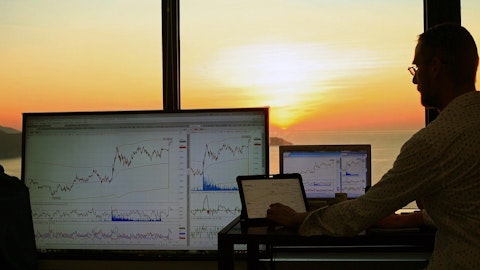Daniel Fisher: Yeah. There’s always an opportunity. We’re constantly looking at our portfolio and our customers. And how we look at it, Michael. It’s a great question. So, I look at brand owners and brand builders. And the other thing is, we may be talking to or we may be having — we may have a portfolio of historical beer customers, but those historical beer customers are moving aggressively into other things from an innovation standpoint. So, within the portfolio of some of our customers, we like the fact that they’re acquiring products that they’re innovating products and that they’re pushing new innovations. And so — you’re right. I mean, there is volume ascribed to beer and there’s big volume ascribed to beer, and that’s always going to be an underpinning of us within a volume business.
But as that beer SKUs to other drinks, and other alcohol profiles, it will be a trade-off within their portfolio. We’re selling them the cans. The label they want to put on it doesn’t matter to us. We just want to be with the winners on the brand side.
Mike Roxland: Got it. That makes sense. And then just quickly, can you comment on any additional portfolio rationalizations or temporary closures and maybe contemplating. I think last quarter, you indicated that you’ve taken all the actions you needed to with respect to plant closures. But then there was an industry publication came out with some details, I guess, in December about temporary closures in Brazil. I think you highlighted it broadly in your press release as well. So, first question, are those closures in Brazil temporary or permanent? And then second, quickly, just given the volatility in Brazil over time, and certainly worse in the last few years. Can you walk us through the investment case as to why investing in Brazil makes sense or really doesn’t at this point?
Daniel Fisher: Yeah. So, I would look at the regions, depending on what’s permanent and what’s temporary, a lot of times, labor laws dictate that. And I would tell you, in North America and South America, we’ve always managed our supply chain. So, we’ll curtail lines. We’ll have temporary shutdowns. That’s more reflective of the conditions with which we are managing our South America plant. I think it was mischaracterized as to what we were doing with that. We — whether we — it’s a temporary closure for now, given the existing conditions and economic conditions in Brazil. It’s no different in the analysis, right? It’s EVA. We do have a larger risk profile and hurdle rate in places that are more volatile like Brazil. So that’s already embedded.
So, it’s going to be the length of the contract, the substantive nature and the economic underpinnings of that contract and whether or not we believe we can generate EVA. I don’t know, Scott, if there’s anything to add on Brazil.
Scott Morrison: I mean, Brazil over a long period of time has been a really good place to invest. The can share has grown in all of the markets that we’ve operated. It does tend to be a more volatile region. And so you have to live with that volatility. But over the long run, it’s been a great place to invest and we expect it to be a really good place going forward. It is not without its challenges, but that’s part of why you can make some pretty good money there, too.
Mike Roxland: Got it. Thanks for the color and good luck in 2023.
Daniel Fisher: Thank you, Mike.
Operator: Next question from the line of Adam Josephson with KeyBanc. Please go ahead.
Adam Josephson: Thanks. Dan and Scott, good morning. Hope you all well.
Daniel Fisher: Thanks. Good morning.




